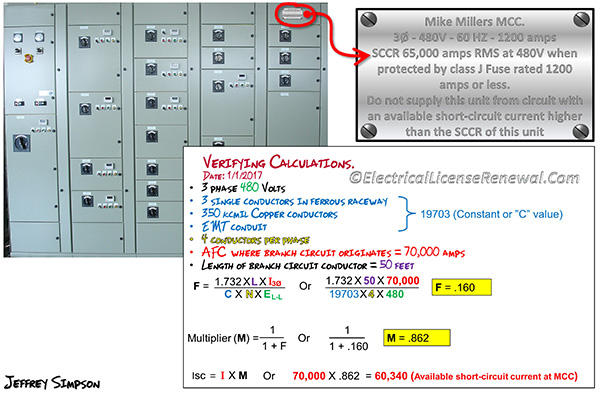430.99 Available Fault Current.

Code Change Summary: A new section was added to address the available fault current at motor control centers.
“Available short-circuit current” is the amount of fault current that can be delivered to the equipment during a short circuit condition originating at the equipment. A movement is occurring throughout the NEC® to raise awareness of available fault current, short circuit current ratings (SCCR) and proper application of NEC® 110.9 and 110.10 which have existed rather silently in the NEC® for quite some time.
Motor control centers (MCC) are required by 430.98 to be marked with their SCCR. As well, according to UL 845, the Standard for Motor Control Centers, a motor control center (MCC) must be marked “Short-circuit current rating amps - RMS symmetrical volts - maximum. Do not install on circuits with available short-circuit currents greater than the lowest short-circuit rating of any installed unit," or the equivalent (see image).
The intent is so that the electrician and inspector can ensure compliance with NEC® 110.9 and 110.10. These code sections require a close look at things like overcurrent device ampere interrupt capacity (AIC), circuit impedance, circuit characteristics and SCCR’s of equipment. This is to ensure that the overcurrent device protecting the equipment is rated properly so that it can eliminate the fault condition before extensive damage occurs to the equipment.
The only way to ensure the MCC is rated to handle the amount of available short circuit current is to first find out the maximum amount of fault current that could be delivered to the MCC during a short circuit condition and then to determine the SCCR of the MCC by looking at the nameplate. As long as the MCC has a SCCR equal to or greater than the available short circuit current, then the installation complies with NEC® 110.10.
In the 2017 NEC®, new language requires a calculation of the available short circuit current to be made for the MCC. This documentation must be made available to those authorized to inspect the installation and include the date of the short circuit current calculation.
Knowing the amount of available short circuit current at the MCC is the first step in ensuring that the MCC is properly rated for the worst-case fault condition that it may see.
Below is a preview of the NEC®. See the actual NEC® text at NFPA.ORG for the complete code section. Once there, click on their link to free access to the 2017 NEC® edition of NFPA 70.
2017 Code Language:
N 430.99 Available Fault Current. The available short circuit current at the motor control center and the date the short circuit current calculation was performed shall be documented and made available to those authorized to inspect the installation.